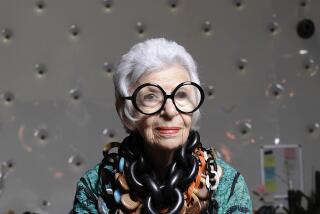John Bayley, half of a famed and devoted literary couple, dies at 89
As marriages go, John Bayley and Iris Murdoch’s was one for the ages — doting, dotty and undyingly tolerant.
He was the eminent critic and Oxford don, who also was known to stuff his pockets with leftovers. She was the brilliant novelist and skinny-dipping libertine, whose philosophical treatments of love and freedom brought her the Booker Prize and an English title.
In their more than 40 years together, they shared a private language of endearments and lived in tranquil squalor in a country house overrun with books, mail, piled-up clothes and moldering scraps of food. Visitors were spared none of the mess.
When Murdoch began to “sail into the dark” of Alzheimer’s disease, Bayley fed, dressed and cleaned her. He refrained from tidying up her image, however, writing an unflinching portrait of his wife in decline that moved critics but outraged friends.
Bayley, whose bestselling “Elegy for Iris” (1998) earned him his broadest audience and inspired the 2001 movie “Iris” starring Judi Dench and Kate Winslet, died Jan. 12 at home in Lanzarote in the Canary Islands. He was 89.
His death from heart insufficiency was confirmed by his longtime editor, Robert Weil.
The distinguished academic had started out as a novelist but concentrated on criticism after meeting the prodigiously talented Murdoch, “one of those meteors,” he later wrote, “who are instantly recognized.” He became a prolific scholar, particularly astute on Shakespeare, Tolstoy, Pushkin and Jane Austen. His last book, “The Power of Delight” (2005), was a collection of his essays spanning 656 pages and 40 years.
Murdoch wrote more than two dozen novels peopled with cerebral characters in tangled relationships. She won the Booker, England’s most prestigious literary prize, for the 1978 novel, “The Sea, the Sea.”
She continued to collect accolades until the mid-1990s when she fell, as Bayley later put it, “under the dark escort” of a dreaded disease. Critics found her last novel, “Jackson’s Dilemma” in 1995, repetitive and inconsistent. “The writing,” said one reviewer, “is a mess.”
The following year, Bayley told a London newspaper that Murdoch had Alzheimer’s. He was her primary caregiver.
At Weil’s urging, he began to write of his life with Murdoch as she slipped away. Divided into two parts, which he simply called “Then” and “Now,” “Elegy” drew glowing reviews for its brutally frank depiction of Alzheimer’s and lyrical treatment of a remarkable marriage.
“What makes [Murdoch] alive in these pages is her husband’s love, which is so absolute and mysterious that it pervades every word he writes,” Christopher Lehmann-Haupt wrote in the New York Times.
That admiration was not shared by many of their friends, who were pained by its disclosures. Bayley wrote that his wife could not form coherent sentences, was incontinent and passed the mornings watching “Teletubbies” on television.
“The privacy that Murdoch cherished at the best of times … has been violated by showing her at the worst of times,” historian Gertrude Himmelfarb wrote in Commentary. “It is a curious ‘elegy’ that we are presented with — an elegy for Iris that has a way of turning into an homage to John.”
The author made no apologies. “I thought that if I could write something about her that was interesting, more people would want to read her books, which are so good,” he told Telegraph Magazine in 2001. “And while I was writing, the real Iris came back to me, which gave me great pleasure.”
Bayley wrote much of “Elegy for Iris” and his next memoir, “Iris and Her Friends” (2000), with Murdoch next to him in bed. His last memoir, “Widower’s House: A Study in Bereavement; or, How Margot and Mella Forced Me to Flee My Home” (2001), sparked controversy when Bayley suggested in an interview that he had fictionalized his adventures with the women who pursued him after Murdoch’s death in 1999.
John Oliver Bayley was born March 27, 1925, in what is now the Pakistani city of Lahore. The son of a British army officer, he served in the army from 1943 to 1947 and earned a degree from New College at Oxford in 1950.
He was about to begin his teaching career when he saw Murdoch for the first time, in 1954, bicycling past his window. He “believed her to be old, wise and plain, and hoped therefore that he had minimal competition,” according to Murdoch biographer Peter J. Conradi. But the besotted scholar, who was six years her junior, was wrong on one score: She had many lovers.
In 1956 she gave them up to marry the charmingly self-effacing Bayley. “I met a man I couldn’t say ‘no’ to,” she told the Guardian in one of her last interviews, in 1996, “and I couldn’t be persuaded to throw him away.”
He published his first novel, “In Another Country,” in 1955, then not another for four decades. He taught at Oxford for nearly 50 years, the last 18 as the Warton professor of English literature at St. Catherine’s College. He retired in 1992.
He is survived by his second wife, longtime family friend Audi Villers, and a brother, Michael.
Murdoch remained ever-present in his mind.
One moonlit night before his remarriage in 2000, he and Villers were outside her home in Lanzarote, watching a rare cactus bloom.
“We stood hand in hand in the silence while the light from Audi’s torch stole about among the gigantic ghost blooms,” Bayley recalled. “The flowers were like a dance of the blessed spirits. I didn’t believe in blessed spirits, but I believed that Iris was with me once more, joining us and making us three in the warm breath of the night.”
Twitter: @ewooLATimes
More to Read
Start your day right
Sign up for Essential California for the L.A. Times biggest news, features and recommendations in your inbox six days a week.
You may occasionally receive promotional content from the Los Angeles Times.







